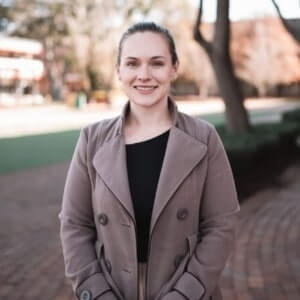- 4 years (or part-time equivalent)
- External
- Feb, Jun
- View dates
- AUD 13,464
- (Indicative annual fee)
- External 909185
Overview
- Are you a UniSQ Bachelor of Social Work student wishing to advance your skills and open up more career opportunities? UniSQ’s Bachelor of Social Work (Honours), is the next ideal step after successful completion of your first two years of the Bachelor of Social Work.
- Become a practice-ready graduate social work practitioner and be a catalyst for change, dedicated to achieving social justice, inclusion and wellbeing. In an uncertain world, social workers have a key role to play – from working with individuals, assisting a family, working alongside a community group or advocating for social justice.
- Gain credit for all courses you completed in Years 1 and 2 of the Bachelor of Social Work (provided you meet the entry requirements). Continue on to complete an additional two years, with research embedded.
- Have the opportunity to complete an independent research project. There are a trio of courses related to the research. These three courses are undertaken in Year 3 and 4 of the degree.
The decision was easy
The decision was easy to come to UniSQ - I like the quality of the university, the environment, it’s location and the diversity of its students.
James - Health
Career outcomes
- A degree in social work opens doors to careers in agencies and services that offer opportunities to work with individuals and families within the community. Graduates can provide social work services in various areas, including child protection, youth justice, domestic and family violence, mental health services, disability support, hospitals and healthcare, sexual assault services, asylum seeker and refugee support, community services, and schools.
- Additionally, this degree equips graduates to contribute to societal change through advocacy, policy development and evaluation, and legislative input.
- While honours graduates can still practice as social workers in chosen fields of practice; an honours degree demonstrates high academic achievement. Having a Bachelor Social Work (Honours) can provide a pathway for further research either in regard to employment or additional study. This degree gives you prerequisite research skills to undertake a higher research degree.
Professional accreditation
Graduates will be eligible to apply for membership with the Australian Association of Social Workers (AASW).
What you'll study
To graduate from the Bachelor of Social Work (Honours), you must successfully complete 32 units of study.
Degree structure
An undergraduate university degree typically consists of a combination of core, major and elective courses designed to provide you with foundational knowledge and opportunities for an in-depth deeper dive into your chosen field.
Refer to the UniSQ Handbook for detailed recommended enrolment patterns and course availability.
You may be eligible for recognition of prior learning if you have previous studies or relevant work experience. This could reduce the number of courses you need to study to complete your degree.
Degree requirements
You will be required to participate in two 500-hour industry-based placements. Typically taken in the later years of your degree, you will be mentored and supervised by an experienced social worker in a chosen field of practice. You could be placed in a wide range of government and non-government agencies, from child and youth Mental Health Services, emergency department in a hospital, domestic and family violence services, first nations services or child safety services.
All students must be able to meet the physical and other professional requirements of practical placements within this degree.
You will be required to attend 5 days of residential school workshops each year of the degree, totalling 20 days of face-to-face residential workshops at UniSQ Toowoomba. This is a requirement of the external accrediting body – Australian Association of Social Workers.
Other study options
If you’re interested in further study, after completion of this degree you can go on to study the Doctor of Philosophy (PhD) (if you meet all the entry requirements).
Entry requirements
You need to satisfy the following requirements to be considered for entry into this honours degree.You can enrol into the Bachelor of Social Work (Honours) at the end of your second year of the Bachelor of Social Work. Enrolment depends upon meeting the following four criteria:
- successful completion of the first two years of the Bachelor of Social Work;
- your GPA is 5.0 or higher;
- your research involves low risk ethics or no need for an ethics proposal; and
- a supervisor can be matched to the research project.
If these four requirements are met Bachelor of Social Work students may be invited to enrol in the Bachelor of Social Work (Honours) from Year 3.
All applicants
You'll need to meet the applicable English language requirements and this degree requires:
- IELTS (Academic) - Minimum overall score of 7.0 and a minimum score of 7.0 in each of the four components - listening, reading, writing, and speaking.
Alternative English language proficiency tests may also be accepted.
During your study
While not needed to apply, you'll need to meet these requirements throughout your studies.
Inherent requirements are fundamental skills, capabilities, and knowledge that you must be able to demonstrate to achieve the essential learning outcomes of the degree, while maintaining the academic integrity of the degree.
If you think you may experience any problems meeting inherent requirements, you can talk to an Accessibility Support Officer about reasonable adjustments that may be put in place to assist you. Any reasonable adjustments made must not fundamentally change the nature of the inherent requirement.
Review the inherent requirements for this degree.
All students must provide the following documents prior to commencing field education/placement courses:
- Blue Card or Working with Children Check
- National Disability Insurance Scheme (NDIS) Workers Screening Card
- Australian Police Check Certificate.
You must also provide the following immunisation evidence prior to commencing placements:
- Hepatitis B immunisation evidence
- Measles, Mumps and Rubella immunisation evidence
- Varicella immunisation evidence
- Pertussis immunisation evidence
- Influenza immunisation evidence
- Tuberculosis Risk Assessment.
Entry pathways
You can enrol into the Bachelor of Social Work (Honours) at the end of your second year of the Bachelor of Social Work. Check entry requirements for more information, or get in touch to discuss.
Fees and scholarships
- This estimated 2026 annual fee is based on the current average rate for your first year of study (8 units per year) and does not include cost of materials such as textbooks, additional costs or the Student Services and Amenities fee.
- This is an indicative guide only and your fees will vary depending on the courses you select, with the actual rates calculated at enrolment.
- We review our fees annually and they may increase each year.
- Further details are available on the Fees website.
Additional costs
You may be required to pay the Student Services and Amenities Fee as part of your degree cost.
This degree includes an on-campus residential school component that involves travel, accommodation, and meal expenses.
Placement courses may incur some additional costs, including uniform and equipment, transport to and from venues and, in some instances, living expenses, particularly for placements in rural and remote settings.
You may be eligible to receive the Commonwealth Prac Payment (CPP) designed to help cover some of the costs associated with mandatory placements.
Payment options
You may not have to pay your course (subject) fees upfront. HECS-HELP is a government loan scheme that allows you to defer payment until your income reaches a certain threshold. Find out if you are eligible for HECS-HELP.
You may also be eligible to receive financial support from Services Australia.
UniSQ Scholarships
We offer scholarships for academic excellence, community leadership, and financial need - you can apply for more than one!
Find out moreHow to apply
You can apply to study at UniSQ via the Queensland Tertiary Admissions Centre (QTAC) website.
- Copy the QTAC code for the study location you've chosen for this degree.
- Click on the location you’ve chosen in the below table to take you to the Queensland Tertiary Admissions Centre (QTAC) website.
- Select 'Apply Now' to create a QTAC account.
| Location | QTAC Code |
|---|---|
| External | 909185 |
Some applicants may be eligible to apply directly to UniSQ if they meet certain criteria. Explore the application process that’s right for you.
You can select to start your study in Trimester 1 or 2.
| Study period | Application closing date | Orientation | Start date |
|---|---|---|---|
| Trimester 1, 2026 | Monday 16 February | Monday 9 February | Monday 16 February |
| Trimester 2, 2026 | Monday 1 June | Monday 25 May | Monday 1 June |
More information on application key dates is available.
Preparing to apply
You've made the decision to study at UniSQ - congratulations! Take the next steps:
The documentation you need to provide with your application depends on your qualifications.
If applying through QTAC, you will also need a Unique Student Identifier which is your individual education number for life.
Follow our easy instructions to discover further information on applying to study that’s right for you.
Depending on how you applied to study at UniSQ, the process to accept your offer will vary.
Offer to study at UniSQ from QTAC
- QTAC will send you an email if you have received an offer. To respond to your offer, log in to the QTAC application portal.
- Information regarding QTAC key dates for when offers will be made is available.
- Didn’t receive an offer? Don’t worry – you may just need to update your preferences.
Offer to study from UniSQ
- After you’ve submitted your application, you will be emailed a reference number. You will be notified via email the outcome of your application within 10 business days.
- Follow the link in your email from UniSQ or log in to the application portal to accept your offer.
Find out more
Connect with us - start a conversation, whenever suits you.
Frequently asked questions
The entry requirements for the Bachelor of Social Work (Honours) will vary depending on your chosen education provider.
At UniSQ you can enrol in the Bachelor of Social Work (Honours) after you have successfully completed the first two years of the Bachelor of Social Work and:
- you have a GPA of 5.0 or greater.
- the research you propose to undertake involves low risk ethics or no need for an ethics proposal.
- UniSQ can match you with a suitable supervisor based on the subject of your research project.
- you meet additional requirements for placements.
If you don’t meet the entry requirements, our Bachelor of Social Work is a pathway option to the Bachelor of Social Work (Honours).
For further information please view the entry requirements section of this page.
Qualified social workers have many exciting job opportunities across a variety of allied heath and psychology and human services sectors including:
- Asylum seeker and refugee support
- Child protection
- Disability support
- Family and domestic violence
- Hospital, private clinics and health care
- Mental health services
- Schools
- Youth justice.
For further information please view the career outcomes section of this page.
Get a strong start to your career in social work.
- Graduate with the knowledge, skills and an ethical practice framework, enabling you to effectively delivery critical social work services.
- UniSQ’s Bachelor of Social Work (Honours) graduates are eligible for membership with the Australian Association of Social Workers.
- A Bachelor of Social Work (Honours) qualification can provide a pathway further extend your expertise and knowledge with a higher research degree.
- We are #1 in Australia for social work learning resources and #1 in Queensland for graduate starting salary (Good Universities Guide, 2026).


